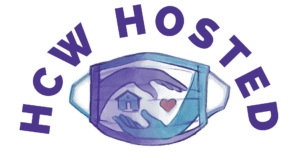One of the primary roles of HCW HOSTED is advocacy for healthcare workers, broadly defined.1 High on our list, beyond advocating for support services and resources for healthcare workers, is advocating for public policies and social norms that prevent the health care system from becoming swamped with COVID-19 cases.
When the system gets swamped by severe cases, healthcare workers are placed at greater physical risk and may also suffer from emotional distress, compassion fatigue, and burn out.
Toward that end, and to counter toxic individualism2 (self preoccupation at the expense of others) that undermines public health, we have promoted a Health Citizen Pledge.
The Pledge encourages each of us to take the time to consider what role we can play in mitigating the spread of COVID-19 in our community.
We use the term citizen as a verb associated with taking responsibility for the common good, and not as a noun conferring a sense of individual entitlement as a birthright. Likewise, we use the term pledge as a verb indicating a promise, not an oath or contract.
By signing the Pledge we promise to access reputable sources of information about COVID-19, such as that featured on the website of HCW HOSTED to:
- Take steps to protect ourselves and our community from the virus
- Develop a viable COVID-19 plan should we test positive
- Support evidence-based COVID-19 policies
Above all, the Pledge is meant as a means to initiate dialogue about our civic duty in the time of a pandemic when we must act together to both reach herd immunity and protect our health care system.
To date, over 2400 people have signed the Pledge. This is a good beginning. In the future, we hope to encourage teachers to use the pledge in their classrooms as a means of talking to students of all ages about the meaning of participatory health citizenship, a concept vital to our democracy above and beyond COVID-19.
Notes
1. The CDC defines “health care personnel” as paid or unpaid workers “who have the potential for direct or indirect exposure to patients or infectious materials, including body substances; contaminated medical supplies, devices, and equipment; contaminated environmental surfaces; or contaminated air. ”These workers include not only medical providers but also “support staff” in areas such as food, environmental, security, and administrative services. The CDC estimates that under those definitions, there are 21 million health care workers in the United States.
2. For more on toxic individualism:
National Public Radio, ‘Toxic Individualism’: Pandemic Politics Driving Health Care Workers From Small Towns, December 28, 2020
LA Times, Column: Column: U.S. individualism isn’t rugged, it’s toxic — and it’s killing us, October 30, 2020

